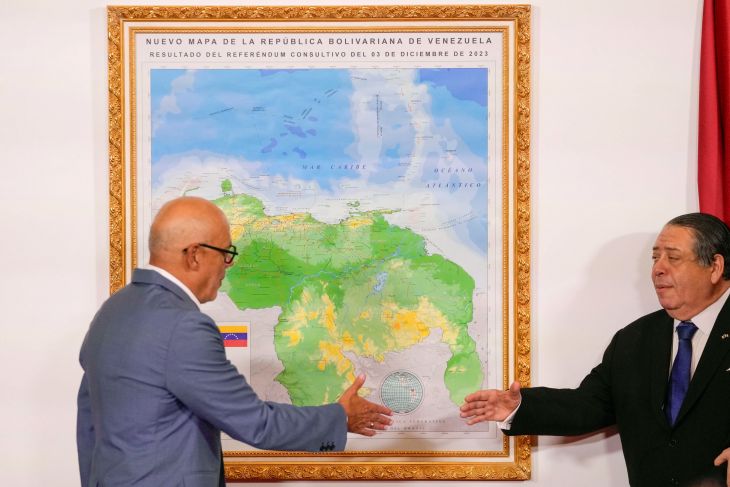On December 3rd, Venezuelans voted to back their country’s historical territorial claim over the Essequibo – an oil rich territory that has belonged to Guyana since it was known as British Guiana.
The Essequibo region, which covers an area of approximately 159,500 square kilometers has been a long-standing territorial dispute between Guyana and Venezuela.
The origins of the dispute can be traced back to the 1814 Treaty of Paris, which ended the Napoleonic Wars and transferred control of the Essequibo region from the Dutch to the British. However, Venezuela argues that the treaty was invalid as it was signed without its consent and that the region rightfully belongs to them.
Venezuela has long maintained that a decision taken in 1899 by an international arbitral tribunal to award it to Britain, the colonial power which at the time ruled over Guyana, was unfair.
The dispute escalated in the early 20th century when significant oil reserves were discovered in the region. Venezuela intensified its claims over the Essequibo region and, in 1962, officially laid claim to the entire territory of British Guiana, including the Essequibo region, by issuing a decree known as the "Decree of the 17th of February."
The dispute has had significant implications for both Guyana and Venezuela.
For Guyana, the dispute has limited its economic development and potential exploitation of the region's natural resources. The uncertainty surrounding the ownership of the Essequibo region has deterred foreign investment and limited the country's ability to fully utilize its resources.
Venezuela, on the other hand, has used the dispute as a political tool to assert its dominance in the region. The country has consistently opposed any attempts by Guyana to develop the Essequibo region and has even gone as far as to block international funding for projects in the disputed area. The dispute has also provided the regime of Nicolas Maduro with an opportunity to try to rally public support for a dictatorship that has mismanaged Venezuela economically and politically.
In recent years, the dispute has gained renewed attention due to the discovery of additional offshore oil reserves in the region. The potential economic benefits of these reserves have further heightened tensions between Guyana and Venezuela. In 2015, Guyana filed a case with the International Court of Justice (ICJ) to seek a legal resolution to the dispute. The case is currently ongoing, and both countries have presented their arguments before the court.
The Essequibo dispute is not only a territorial issue but also a matter of national identity and pride for both countries. Both have strong historical and cultural ties to the region, and the dispute has become deeply ingrained in their national narratives. This has made it even more challenging to find a mutually acceptable solution.
The resolution of the Essequibo dispute is crucial for the stability and development of the region. It is essential for both Guyana and Venezuela to find a peaceful and diplomatic solution that respects the rights and aspirations of both countries. The involvement of international organizations such as the UN and the ICJ can play a role to help ensure a fair and impartial resolution to the dispute.
The legacy of colonialism around the world has contributed to border challenges in many parts.
The Essequibo challenge is matched in the Western hemisphere by a similar dispute between Belize and Guatemala.
The unilateral drawing of national borders by Britain and France among others has also led to massive disputes in Africa. Here, tribes were divided among different states resulting in much violence, especially in Rwanda where over a million Tutsis were slaughtered by Hutus in 1984.
The creation of artificial borders and artificial countries by Britain and France in the Middle East has also resulted in much turmoil and death.
It is too late to change national borders now, and too late for both sides to any territorial dispute to be content with any proposed outcome.
In the case of the Essequibo, one solution may well be for both Venezuela and Guyana to exploit the resources of the disputed territory together through a joint venture holding company in which each state holds 49% ownership, with the remaining 2% in the hands of a neutral entity (the United Nations or the Organization of American States, for example).
This has worked well in Andorra, where Spain and France share co-ownership.
It remains to be seen whether Venezuela and Guyana can set aside their differences, think outside of the box, and come to solution to this long-standing problem.
Keep reading: The European Union?
Edición: Fernando Sierra
Estará dentro de la nueva torre de especialidades del Hospital General Jesús Kumate Rodríguez, en BJ
La Jornada Maya
El desfile y los espectáculos reunieron a miles de asistentes en una celebración multicultural
La Jornada Maya
El empresario es muy reconocido en la industria turística del Caribe Mexicano
Ana Ramírez
Tuvo como objetivo brindar certeza jurídica a quienes buscan comprar, vender o invertir en bienes raíces en el municipio
Miguel Améndola
